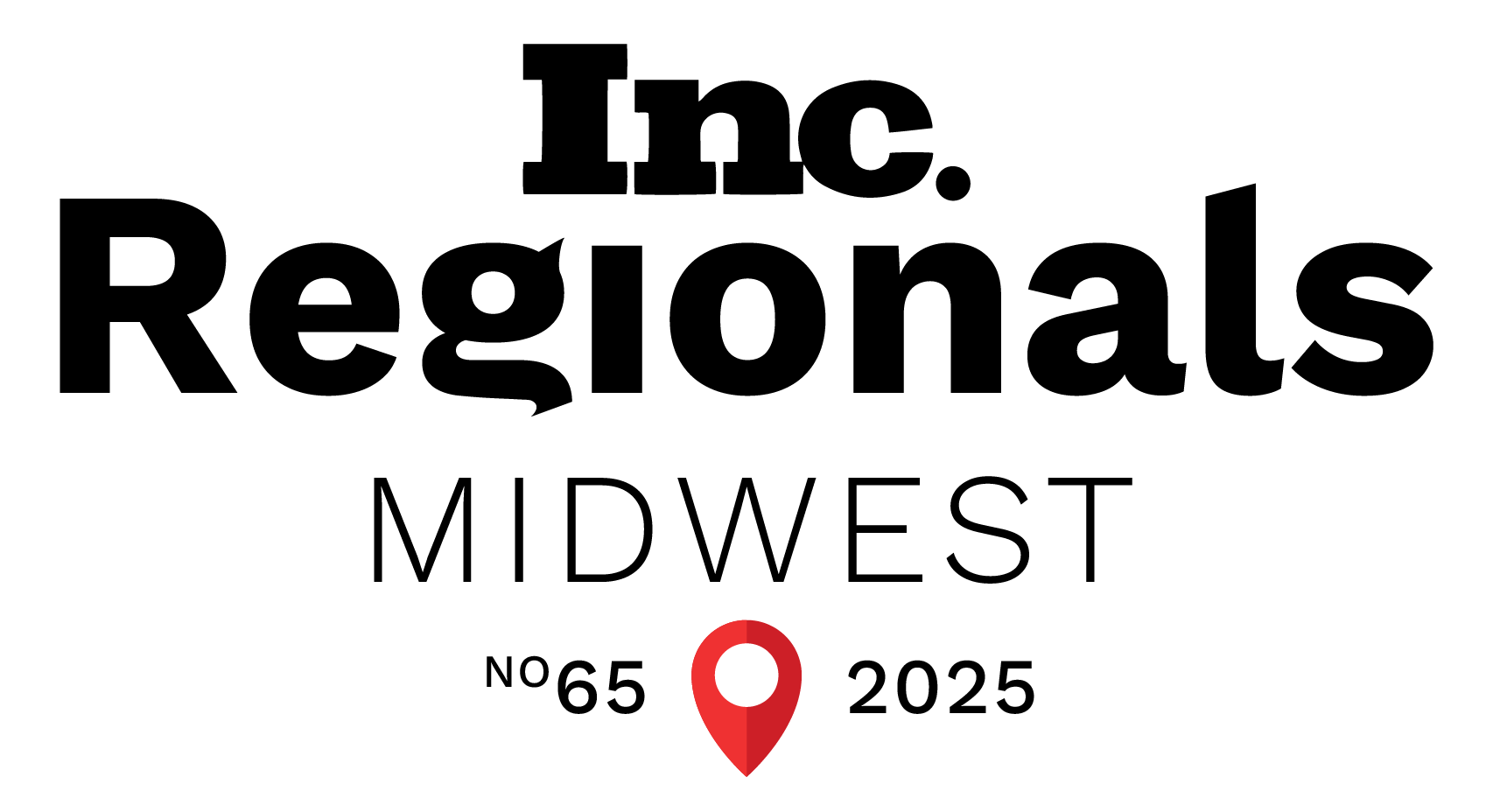
Immigration Law Firm Marketing: How to Market Immigration Services

Immigration Law Firm Marketing: How to Market Immigration Services
Immigration law is a competitive industry. In fact, more than 13,000 U.S. law firms specialize in immigration. But smart digital marketing strategies can help you stand out from the crowd. You have expertise at your firm, and you know that your services are excellent—but is your target market aware?
Digital marketing is the key to reaching the right people at the right time with the right message. Word-of-mouth has been the go-to strategy for finding clients for many law firms. However, that approach limits your growth when prospects are more likely to consult search engines for the information they are seeking.
And even if they do get a recommendation from someone else, they’ll likely go to your website to learn more about your firm before they’re ready to make a call.
Here at Metric Marketing, we specialize in immigration law firm marketing and have helped many legal firms increase SEO and build their caseload. There are many ways you can use digital platforms—and not just websites—to market your immigration law firm online, but we’ll focus on some of the most effective strategies from our own experience
How to Market Immigration Services
Immigration attorneys are problem solvers. The goal is to carefully craft websites, social media content, emails, advertisements, and blogs to demonstrate how your law firm can solve your target market’s challenges. All of which start with buyer personas.
What Is a Buyer Persona?
A buyer persona is a fictional representation of your ideal client based on qualitative and quantitative data. It’s a foundational tool that should inform every aspect of your marketing strategy.
It’s not enough to just know your audience’s problems and offer them solutions. It’s also important to know their motivations, basic demographics, communication preferences, common objections, and the questions they’re asking.
Here’s what buyer personas can do for your business:
- Improve your conversion rates with valuable segmentation strategies.
- Allow you to spend your marketing budget more effectively.
- Ensure you’re investing time on the right platforms.
- Help you tailor messages that directly answer questions your prospects are asking.
So, where do you find all this insider information? Below are four excellent sources for both qualitative and quantitative data.
- Customer interviews: During these interactions, you can learn why clients chose you and gather some insights into how their process led them to your firm.
- Surveys: Conducting surveys allows you to test the knowledge you learned in the interviews with a larger group of actual clients.
- Website analytics: This quantitative information lets you learn more about who is considering your firm or relying on your resources.
- Social listening: You can learn detailed information just by observing how your target audience interacts in public online social settings. You can see what questions they’re asking others, and what resources they’re sharing.
What Is Included in a Buyer Persona?
The most effective buyer personas go much deeper than demographics. And they shouldn’t be based solely on assumptions and anecdotal information.
Your buyer persona should focus heavily on the buyer’s journey—aka the path that prospects take to becoming a client. It should also include key objections they have to hiring an attorney and the best responses to those objections. Finally, you should have an overview of how they prefer to engage with content, where they are most likely to be online, and who influences them.
How Many Personas Should You Build?
The less-than-satisfying answer to this question is always, “it depends.” Typically, you segment your audience by what it is they’re trying to achieve (not their demographics, age, or income).
So, for immigration attorneys, your segments might include:
- Individuals applying for a visa or waivers
- Citizenship applications
- Business-related immigration cases
- Deportation defense
In each segment, the target audience has a different goal they’re trying to achieve, and your marketing strategy should show them how your firm is the best choice for achieving that goal.
Once you have your research in place, you can focus on the tactics and platforms to help you reach your target audience. Let’s get into the specifics of how to market immigration services.
Immigration Lawyer Website Development & Design
Your website is the first impression your potential clients will have of you and your law firm. You want it to be attractive, professional, easy to navigate, and trustworthy.
Below are some tips for ensuring your website checks all the boxes.
Content Elements
- Contact information is obvious: On your home page, contact information should be at the top, in the footer, and in the body of the page. In addition to a phone number, you can also include a contact form that allows visitors to send you an email directly from your website.
- Introduce visitors to your team and your firm: To create a sense of familiarity, let people know more about the team at your firm. This section might be called “Meet the Team” or “Who We Are.”
- Include testimonials: People appreciate reviews because they let them know more about other clients’ experiences. This is an effective way to build trust and provide social proof..
- List your services: Services should be in the navigation bar at the top of your website, but they can also be listed on the home page. Each service should be explained in detail on a separate page to improve search engine optimization (or SEO, which we’ll talk more about soon).
- Resources: This is the section for your blog, videos, FAQ, and newsletters. The resource section is important because it is where new content will be regularly added and updated (which also supports search engine optimization).
Design Elements
- Make sure it’s mobile-friendly: Most people use their phones to do basic research, so your immigration attorney website must work well on any device. Luckily, there are many options available for creating a responsive design—one that automatically reflows content based on screen size—so users can access the information they need regardless of whether they’re browsing on a desktop or mobile device.
- Navigation should be intuitive: Visitors don’t want to waste time trying to look for what they need on your site. If they’re bouncing from page to page without finding anything helpful, they’ll likely become frustrated (and leave).
- Create modern and crisp branding: Everything from color to fonts can impact a visitor’s first impression of your firm.
- Choose the right images: Your buyer persona can help guide you in choosing the right images to use on your website. Ideally, they should, in some ways, reflect the people looking for resources on your website.
- Utilize white space: A cluttered website is hard to navigate and understand. Make sure each element has enough space to make the website feel organized and the information easy to read.
Immigration Lawyer SEO Services
Search engine optimization is the process of optimizing your website so that it ranks higher in search results. SEO is a long-term strategy, not a quick fix. It’s not just about keywords but rather about the content on your site and how users interact with it.
Immigration attorneys should use marketing strategies to optimize every page to ultimately help you find the right client. But what does it mean to optimize every page?
We’ve outlined some effective tactics that can ensure your website is built for both visitors who are searching for helpful content and the algorithms that dictate your website’s ranking.
Create a Free Google Business Profile
Google My Business is a free tool that allows you to create a business listing on Google.
This means you can control the information about your business and add photos, hours of operation, and other important details, such as your physical address, phone number, and website.
Google My Business lets you connect directly with customers and potential clients through local search results.
It also helps drive traffic to your website by increasing visibility in the search results. For example, if someone searches for “immigration lawyer St. Louis, Missouri” using the search bar or Google Maps.
Local SEO
Google My Business is one tactic for local SEO, but this strategy is broader. Local SEO is the process of optimizing your website for the local Google search results, Google Maps, Bing, and other search engines.
Here are some ways to get started:
- Create unique content that contains keywords relevant to the area you serve.
- You should also make sure that you have accurate information about your business on these platforms.
- Ensure that any reviews about you are positive ones, as this helps boost your rankings in search engines and will also increase customer trust in your company. If you do receive a bad review, be sure to respond to the comment with kindness instead of with anger.
- Earn backlinks—aka inbound links (links to your website)—from reputable local websites, such as nearby businesses or local media companies.
- List your company on reputable digital directories.
- Design a location page on your website that lists your location, business hours, phone number, and other ways to contact your firm.
Keyword Strategy
Keyword research is an integral part of SEO because the right words or phrases will help your website rank higher on search engine result pages (SERPs). Higher rankings on search engines correlate with increased website traffic.
An effective keyword strategy will also utilize long-tail keywords, which are phrases that target specific groups of people. Long tail keywords are usually two or three words long and include modifiers like “best” or “in Dallas.”
This approach will help you to rank higher in Google search results. When it comes to long-tail keywords, some are less competitive or less expensive than other keywords. For example, view the comparison of the keyword “Immigration Attorney” vs. “Immigration Attorney Free Consultation”
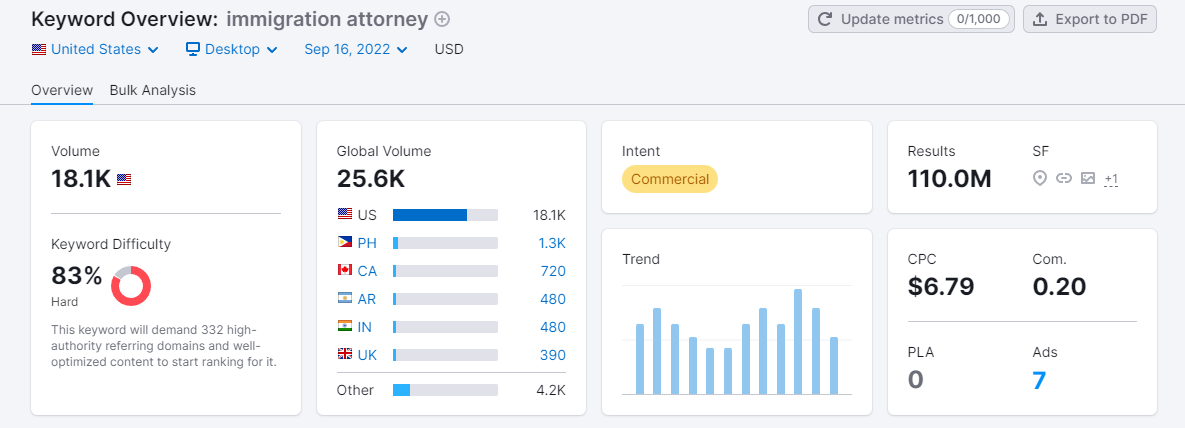
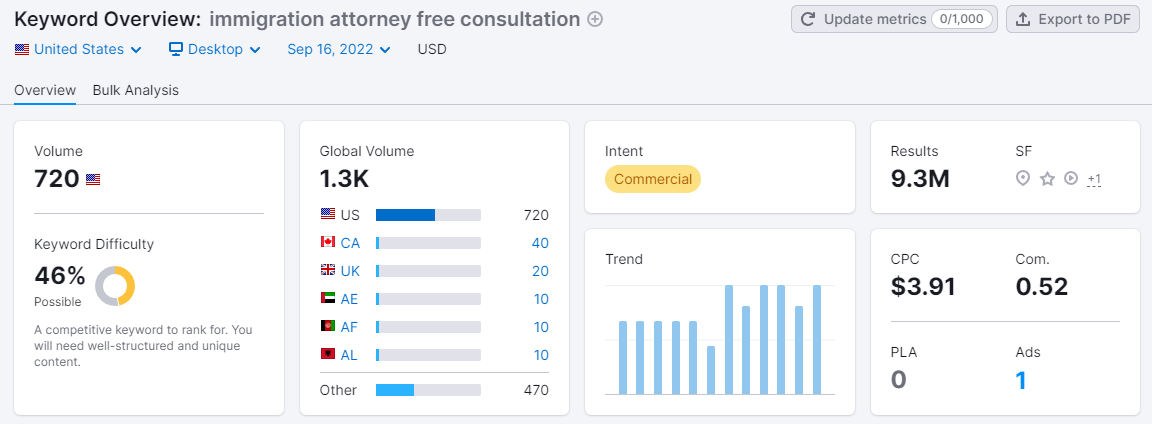
The keyword “immigration attorney” is incredibly competitive. Yes, there is excellent search volume, but according to SEMRush when the above search was performed, the keyword “will require 332 high-authority referring domains (inbound links) and well-optimized content to start ranking.”
Alternatively, “immigration attorney free consultation” has moderate search volume, but all you will need to begin ranking is “well-structured and unique content.”
Of course, your firm might not offer a free consultation. That’s fine. Another long-tail keyword could be “immigration attorney in [insert city]” let’s use Dallas as an example:
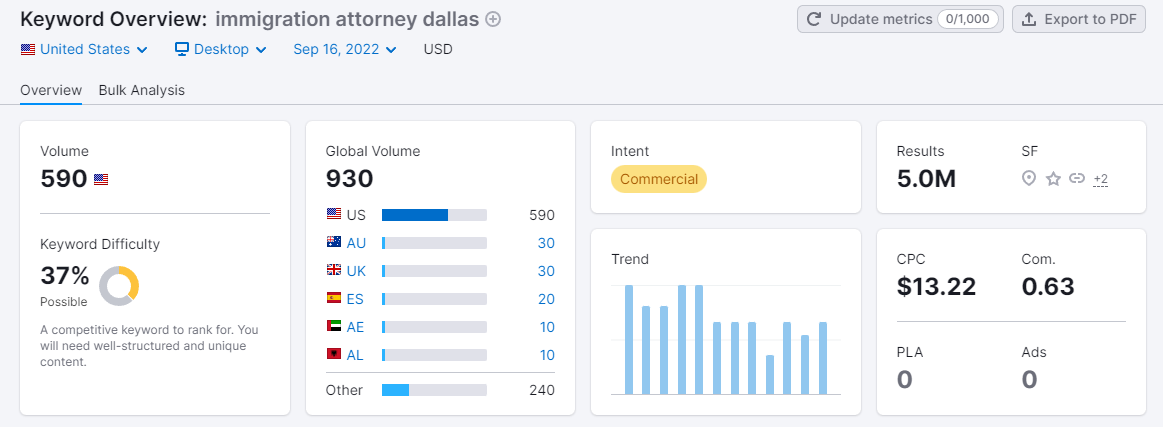
In this example, the keyword difficulty is much lower than “immigration attorney.” You also have the added benefit of optimizing for local SEO. However, it’s important to note that the cost-per-click (CPC) is higher for the long-tail keyword “immigration attorney dallas” versus “immigration attorney.” This might affect your pay-per-click campaign (we’ll talk more about this later).
Keywords for Immigration Attorneys
So, what keywords might be relevant for your SEO strategy on your immigration lawyer website? First, each page should be optimized for a primary keyword, and then secondary keywords should also be incorporated.
Next, your website’s homepage can compete for broad keywords like “immigration attorney consultation” while other pages focus on keywords related to services or topics relevant to your audience.
Here are some sample keywords:
- Immigration attorney [your city]
- Immigration attorney consultation
- Immigration attorney consultation fee
- Best immigration lawyer near me
- Immigration lawyer [your city]
- What is family-based immigration?
- Form I-551 permanent resident card
- Green card vs. permanent resident
- Student visa attorney
- Student visa lawyer
- U.S. student visa requirements
- How much does it cost to get my US citizenship?
PPC Campaigns For Immigration Attorney Marketing
Pay-per-click (PPC) advertising is the process of bidding on keywords—or audiences—on search engines so your ads will be shown whenever a user completes a relevant search query.
The benefit of PPC advertising is that it can be cost-effective when done correctly—you only pay when someone clicks on your link—and it’s an excellent way of reaching people who are already interested in what you have to offer. The drawback is it can be expensive and ineffective if the strategy isn’t targeted correctly.
Here is an example: An immigration lawyer might create a webpage that is optimized for “immigration attorney in Dallas.” Then, they might actually compete for a “sponsored” position on a search engine for someone who searches for “immigration attorney in dallas.”
The ad would then appear whenever someone searched for this phrase or related terms (such as “immigration lawyers near me”). This allows you to place your ad in front of potential clients who are actively looking for legal help even before you are ranking organically.
Here is where they show up on Google:
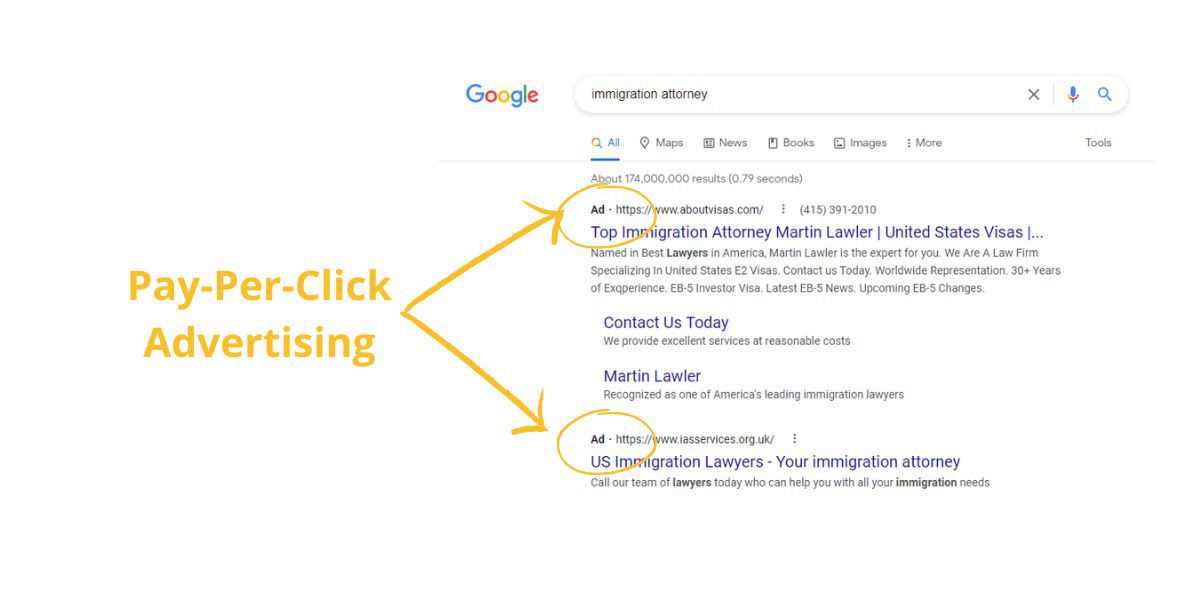
How PPC Advertising Works
You set up a PPC ad campaign on the platform of your choice (such as Google Ads), which will then show your ads in response to certain targeted keywords related to immigration law.
Since it is a bidding platform, usually the business that bids the highest wins the position on the SERP. But that’s not the only factor. Since Google’s objective is to present the user with the best resources based on their query, the winners are also determined by an ad quality score.
Optimizing PPC Campaigns
Intent
Users typically use a search engine for two reasons: gathering information or commercial purposes (intent to purchase).
If you’re paying $25 to $40 (or more) every time someone clicks on your link, ideally you want the visitor to be ready to hire an immigration attorney because that would directly increase your return on investment (ROI).
There are business scenarios where you’d want to push people to your website before they’re ready to hire you, but more often than not, you want your PPC campaigns to increase your number of prospects.
Volume
Next, you want to ensure the keywords you’re competing for have enough volume. This doesn’t mean you automatically choose whichever keywords have the most volume, but you should weigh volume against costs to build a competitive strategy.
Budget
Your objectives for your PPC campaign will depend on your budget. For example, if you have a budget of $6 per click and a daily budget of $60, that’s 10 visitors per day. You might need 50 visitors to your website before you get a lead from your PPC campaign (which would be considered a 2% conversion rate).
In the example above, it’ll take approximately five days and $300 to get your first lead. The key takeaway is that every website and law firm is different, and you’ll have to experiment to determine what ROI you can expect from your PPC strategy.
Immigration Lawyer Content Marketing Ideas
Content marketing is a long-term strategy that can help immigration attorneys build trust, authority, and credibility with potential clients, so when the time comes to hire an attorney, they are more likely to choose your firm.
Additionally, regularly adding new, targeted content to your website will improve your website’s ranking in search results.
Why Does Content Marketing Work?
When someone has a problem that might benefit from hiring an immigration attorney, their first instinct isn’t to call an attorney right away. Instead, they’ll dedicate time to researching their problem to better understand the possible solutions.
Suppose someone has a question like, “how to get a student visa to study in the United States.” They’ll type a version of that into a search engine and browse the first page of results.
On the first page, they might find a government website like Travel.gov as the first result. If they scroll a little further, they might find the article “10 Steps to Get Your Student Visa,” and under that “F1-Visa: Student Visa Requirements and Application.” They’re going to be using these resources to better understand what they need to do to study in the U.S.
If your resources ranked on that first page, you’d be the expert that helped them. And you’d probably be the law firm they’d think to call when they’re ready to consult with/hire an attorney.
Now, think about all the services you offer and all the questions that your prospective clients might be asking regarding those services. That is your content, and the helpful answers you provide will be key to increasing your client portfolio.
Content Marketing and SEO
Content marketing plays an important role in SEO, meaning the best content is built with SEO best practices.
- Linking strategy: Every page should include internal links (links to other pages on the website), eternal links (links to other reputable websites), and backlinks (other websites linking to your webpage).
- Optimized images: Images should be sized correctly to prevent slowing down load times. You should also provide a title and alt text for each one that includes the keyword. Alt text also improves accessibility for people who rely on screen reading tools or software.
- Carefully crafted titles: Since this is the first thing a visitor encounters, make sure it includes the keyword and that it’s concise.
- Meta descriptions: These elements show up under the title on the SERP. It might not directly improve SEO, but a well-written meta description can increase the number of people who click on your link.
- Content quality and quantity: You don’t want content that looks and sounds like everyone else’s content, so you need it to be different in some way. And while there isn’t a correlation between quantity and quality, Google does attribute some additional value to long-form content over short-form content.
- Answer the question: This is the most important element. If users quickly leave your site because you aren’t helpful, it will negatively impact your search rankings.
Content Marketing Assets
Most often, content marketing means producing articles on a regular basis, but it can take other forms too.
Content marketing can include:
- Blogs
- News articles
- Podcasts
- Videos
- Ebooks
- Case Studies
- Checklists
- Infographics
- Guides and how-tos
- Templates
- Webinars or events
Email Marketing for Immigration Firms
Email marketing is an effective way to provide information about your services, send out promotions, and build relationships with both clients and prospects.
You can send out information highlighting your newest published content, helpful tips, the latest testimonials from recent clients, etc.
To get started, you need to have an email list.
How to Build a List
You likely have the email addresses of current and past clients, but how do you send emails to prospects?
There is a valuable relationship between content marketing and email marketing. When people visit your website, you might offer them a guide or ebook explaining some specific topic in depth. You can require basic information like a name and email address to download it, which is an excellent way to start building a prospect list. Even better, you’ll learn more about the topics that matter to your target audience based on the content they’re downloading.
Can you buy email lists? Yes. But this is a problematic approach for a few reasons.
First, if someone didn’t sign up for emails from you, they aren’t going to be looking for you in their inbox and will likely delete anything you send.
Second, there are privacy laws and you have to provide a way for people to unsubscribe to your email list. If you purchase random emails based on demographics or some other qualifier, you might be wasting your marketing budget because they’ll be quick to unsubscribe. Or worse, you could run afoul of legal protections depending on where your clients live.
Email Drip Campaigns
When someone signs up to receive emails from your firm, you can put them in a drip campaign. These are pre-built emails that guide recipients through the buyer’s journey (or maybe a specific topic). You’ll set up automations to release these emails over a specified period of time, such as 6-8 weeks.
A strong drip campaign might earn you a higher click-to-open rate, and hopefully, result in more prospective clients wanting to hire your firm.
Social Media Marketing for Immigration Law Firms
Social media can be used in a number of ways, from engaging with prospects to building relationships with past clients.
Social media also has a direct relationship with content marketing, as the new content you create can be repurposed into several social posts.
Getting Started With Social Media
- Choose your platform(s) carefully. It’s tempting to start an account everywhere and then just crosspost the same content on each platform. But the problem with this approach is that you’ll likely be wasting resources on platforms that won’t offer you a good ROI if that’s not where your audience spends their time. Remember, leverage your buyer persona.
- Use hashtags that are relevant to immigration law so your firm’s website will be found by people searching for those terms on platforms like Twitter, Instagram, and LinkedIn.
- Share industry news articles about topics related to immigration law so that prospective clients see them when they search for information online.
- Track key metrics like engagement, impressions, reach, and clicks to determine what works and what doesn’t.
- Engage strategically with other pages and people by reacting to their posts, sharing, following, and commenting.
- Use paid advertising, such as boosting posts, to earn more reach or target specific audiences with custom ads.
Hire Immigration Law Firm Marketing Experts
The reason most people hire an immigration attorney is that they realize immigration law is complicated and they can’t do it alone. The same goes for marketing. Plenty of law firms do the best they can with the resources they have in-house, but it’s hard, and it takes away from the valuable client work that only you can do.
We have a proven track record of increasing visibility and helping legal firms grow their preferred caseload. Our team of experts is the best in their professional domains. Together, we provide you with a comprehensive strategy—from high-performing websites to outlining a social media strategy—to help your law firm build a digital pipeline that brings in a steady flow of clients.
Want to explore some specific immigration law firm marketing ideas? Give us a call at (734) 404-8714 or fill out our online contact form today. We look forward to hearing from you!
The Ultimate Guide: 6 Digital Marketing Strategies For Law Firms
Six legal digital marketing strategies to help your law firm rank higher on search engines and reach more clients.
Ready to Inquire?








